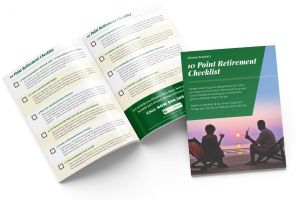At What Age Should You Meet with a Financial Advisor?
Have your question answered on the Money Wisdom Question Series!
One question that frequently arises is: At what age should you start meeting with a financial advisor? The truth is, there’s really no age that’s too early. Meeting with a financial advisor isn’t solely about investments. Often, people express a desire for their children to develop smart financial habits, even if they don’t have significant investments yet. If a financial advisor’s role is limited to managing investments, then they’re acting more as an investment manager rather than a holistic financial planner.
At Johnson Brunetti, our goal is to help people prioritize their financial objectives. We begin by identifying your goals, assessing their realism, and establishing timelines for their achievement. A key part of this process includes balancing priorities, such as deciding when to pay off debt versus when to invest extra cash flow, and determining whether to contribute more to your retirement account or to address non-retirement issues.
Tax, Investment and Legacy Planning
Tax planning is another vital component. It’s about ensuring you pay the least amount of taxes over your lifetime, not just minimizing taxes in the present. Sometimes, this may mean paying a bit more now to save significantly later.
Of course, investments are central to financial planning. We ensure your investments align with your time horizon and meet your needs when required. Additionally, legacy planning is crucial. If something happens to you, who will inherit your assets? Are they set up for success in terms of behavior, investments, and tax efficiency?
The Comprehensive Role of a Financial Advisor
The scope of a comprehensive financial advisor encompasses investments, taxes, priorities, and planning. So, when is the right time to engage with one? There’s no specific age, but different life stages dictate different advisory needs. In your 20s, meeting with an advisor every 3 to 5 years might suffice, primarily to ensure your priorities align with your objectives. You might not need active investment management, as the focus is often on long-term, buy-and-hold strategies.
Preparing for Retirement
However, 5 to 10 years from retirement, the focus shifts. As you prepare to transition to living off your savings, your emphasis isn’t solely on growth. This is when having an advisor for investment guidance becomes crucial, as navigating the retirement landscape can be complex.
In conclusion, while there’s no wrong time to start working with a financial advisor, don’t wait until you’re only 5 to 10 years from retirement. Engaging with an advisor earlier ensures your financial relationship is prepared for the changes that come with retirement.
Download Now
10-Point Retirement Checklist
Here’s a checklist of our most important things you can do, to help you retire strong.

Information presented in our podcasts is considered current as of the created date. Over time, some information presented may become stale. We recommend you consult with your Financial Professional before making any changes based on information contained here.
Johnson Brunetti is a marketing name for the businesses of JB Capital and JN Financial.
Investment Advisory Services offered through JB Capital, LLC. Insurance Products offered through JN Financial, LLC.
The guarantees provided by any type of insurance contract are based on the claims-paying ability of the insurance company.
Related Resources
-
Podcast Episode 416: 5 Must Know Numbers (Before You Retire)
Prefer to watch? Click here to watch and listen on YouTube. Retirement success isn’t a game of luck — it’s about knowing your numbers before you take the leap. From your expected income and tot… -
Working with a Financial Advisor
You wouldn’t let just anyone manage your money or guide you through one of life’s most pivotal milestones. Knowing who to trust with your retirement can make all the difference. With so much on yo… -
Podcast Episode 415: Retiring Soon? How to Adjust to Life Without Work
Prefer to watch? Click here to watch and listen on YouTube. Retirement isn’t just a financial milestone; it’s a major life transition. After decades of building a career, how do you redefine yo… -
How Much Should I Keep in Cash During Retirement?
Having cash on hand can provide a sense of stability and peace of mind at any stage of life. However, in retirement, holding too much cash may limit your long-term returns and erode your purchasin… -
Retirement Planning FAQ
Planning for retirement often raises important questions about managing your finances wisely, reducing your tax burden, protecting your wealth, and making the right decisions for you and your fami… -
Podcast Episode 414: What Does the Big Beautiful Bill Really Mean for Your Retirement?
Prefer to watch? Click here to watch and listen on YouTube. There’s been a lot of noise around the One Big Beautiful Bill Act (OBBBA), an 887-page piece of legislation that just reshaped key el… -
How Much Money Do I Need to Retire Comfortably?
You’re not alone in wondering how much you need to save for a comfortable retirement. After all, you’ve worked hard to reach this milestone, and there’s peace of mind in knowing you’ve taken all t… -
3 Avoidable Retirement Surprises
Even the most carefully crafted retirement plans can go off track if you haven’t accounted for some of the biggest surprises along the way. While many factors can impact your retirement, the good … -
Social Security Myths Debunked
With so many rules and choices involved, it’s easy to feel overwhelmed or intimidated by Social Security. As a key source of retirement income, this decision deserves careful consideration, which … -
Podcast Episode 413: Will Social Security Run Out?
Prefer to watch? Click here to watch and listen on YouTube. Social Security has been making headlines lately, and for good reasons. According to current estimates, the Social Security Trust Fun…

